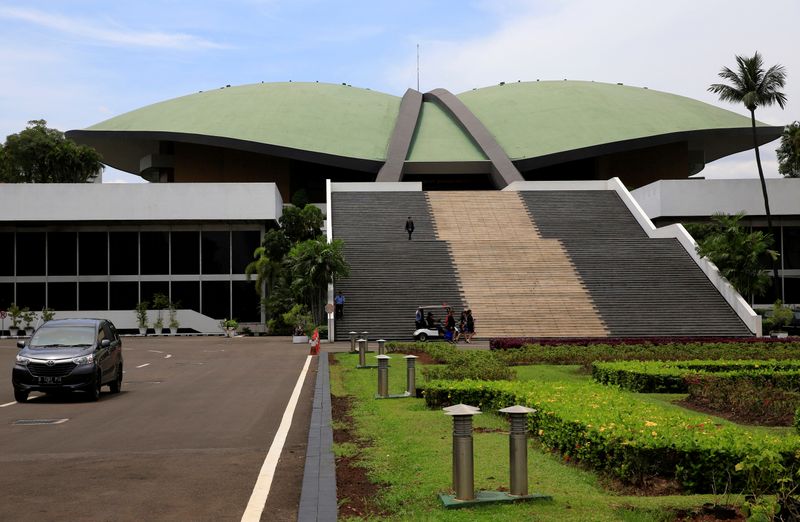By Maikel Jefriando and Tabita Diela
JAKARTA (Reuters) - Indonesia's parliament passed into law President Joko Widodo's flagship "Job Creation" bill on Monday that aims to boost investment in Southeast Asia's biggest economy, but critics ranging from unions to environmental groups pledged protests.
Seven parties backed the bill, while two voted against the legislation that the government says is needed to streamline complicated regulations hampering business and investment.
Global investors have been watching closely the bill's progress, particularly regarding controversial changes proposed to the 2003 labour law, citing a need for Indonesia to compete better for manufacturing relocating from China.
The new law would ensure the "state's presence" in the relationship between employers and workers, Airlangga Hartarto, chief economics minister, told parliament on Monday.
The bill will cut mandatory severance benefits paid by employers to 19 times monthly wages from 32 times now, in line with government proposals, a draft seen by Reuters showed. The state will also pay six months worth of wages to the person concerned.
"In net terms, the passage of the bill should be seen as a positive development.... (but) any positive payback from the adoption of such laws will take time to be felt," OCBC Bank economist Wellian Wiranto said, noting that despite the cut, severance payments still remain above some regional competitors.
A coalition of 15 activist groups, including trade unions, earlier condemned the bill and called on workers to join a planned national strike on Oct. 6-8.
Yusri Yunus, a spokesman for Jakarta Police, said that a permit for the protest had not been approved and due to the COVID-19 situation "we advise all of them not to demonstrate".
NATIONAL STRIKE
While recent rallies against the bill have been relatively small, some vowed to press on with protests.
"We will continue to strike nationwide," said Nining Elitos, chairwoman of the labour group KASBI.
Ahmad Jumali, chairman of the Tanggerang chapter of the Federation of Metal Workers (FSPMI), also said workers planned to shut down production to protest the law.
Workers opposing the bill argue that the legislation would be a "red carpet for investors, widening the power of the oligarchy" that will not only hurt labour protection but also taking land from farmers and indigenous communities.
The so-called "omnibus" bill, aimed at revising over 70 existing laws in a single vote, intends to speed up the pace of economic reform and improve the country's investment climate.
But there have been concerns about the threat to the environment in a country with one of the fastest rates of forest destruction in the world.
The new law means that environmental studies are only required for investments considered high risk.
Separately on Monday, 35 investors who manage $4.1 trillion in assets wrote to the Indonesian government raising environmental concerns over the bill.

"We fear that proposed changes to the permitting framework, environmental compliance monitoring, public consultation and sanctioning systems will have severe... repercussions that... could impact the attractiveness of Indonesian markets," the letter read.